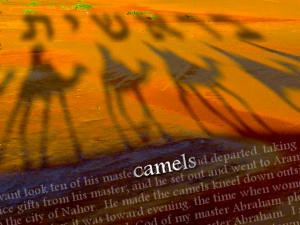What’s the Deal with the Camels in the Bible?
 So far this week, the New York Times and Time Magazine, among many other usually respectable news outlets, have reported on scientific evidence that camels weren’t domesticated until about the 10th century BCE. That’s true.
So far this week, the New York Times and Time Magazine, among many other usually respectable news outlets, have reported on scientific evidence that camels weren’t domesticated until about the 10th century BCE. That’s true.
They add that this is a problem for the Bible because Abraham and the other patriarchs, who owned camels, lived much earlier. This part is wrong. And it demonstrates a pretty surprising naivete on the part of these and other mainstream news organizations.
First of all, let’s be clear. According to Genesis, Abraham lived to be 175 years old, so it’s not the camels that are hard to explain.
But the real misunderstanding is demonstrated by this line from the New York Times: “Abraham, Jacob and Joseph […] lived in the first half of the second millennium B.C.” No they didn’t.
As I’ve explained in detail in And God Said — and summarized on-line for the Huffington Post (“The Bible Isn’t The History You Think It Is“) — the Old Testament is divided into three sections: the creation of the world (Adam up to Abraham’s father Terah), the creation of the Israelites (Abraham to Moses) and life in Jerusalem (after Moses). Only the third part was meant as history. The first two parts — Adam, Noah, Abraham, Joseph, and all the rest — serve other purposes.
So Abraham didn’t live in the first half of the second millennium, just like the heroine in Song of Solomon didn’t have birds for eyes, in spite of the poetic line in verse 4:1 that her “eyes are doves.”
Though I’m regularly surprised that so much misinformation surrounds the Bible, this kind of widespread mistake does help explain why many scientists don’t appreciate the Bible’s value, and why many religionists increasingly have no use for science.




Joel – I don’t think that you’re being completely fair here. YOU know that the Torah wasn’t meant as literal, factual history. But, a (to me) surprising number of people in our world think precisely that — the Torah, and the rest of the Bible, is as accurate as any history textbook.
In theory, proving that someone who lived when Abraham “lived” couldn’t possibly have owned camels would be a fairly strong piece of evidence that the Torah cannot possibly be literally true.
Of course, similar to what you say, this book also included a talking snake (who probably had legs), so I’m going to go out on a limb here and say that anyone who still believes that the Torah is literal truth will probably find a way to explain this, as well.
I understand why you say that. But wouldn’t you think that the New York Times and Time would have the resources to understand the situation in a little more depth? I wouldn’t take a congregant or even a run of the mill clergy member to task for this, but I think these news organizations missed the point. It’s not that there was a guy named Abraham who we now learn didn’t have camels after all.